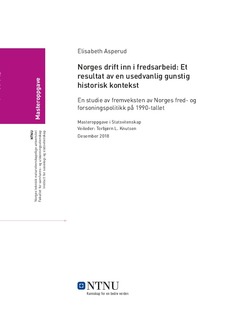Norges drift inn i fredsarbeid: Et resultat av en usedvanlig gunstig historisk kontekst - En studie av fremveksten av Norges fred- og forsoningspolitikk på 1990-tallet
Master thesis

Åpne
Permanent lenke
http://hdl.handle.net/11250/2589632Utgivelsesdato
2018Metadata
Vis full innførselSamlinger
Sammendrag
The aim of this thesis is to explore the emergence of Norway’s peace and reconciliation policy from 1990 and onwards. Since then, Norway has been involved as a facilitator in a number of peace processes in many corners of the world. Today there is a widespread perception that Norway is, and should be, a nation especially devoted to promoting peace. To explain why this is the case, previous studies have focused very much on factors within Norway. It has been argued that Norway has had a tradition for peace promotion ever since the 19th century and that there is something particular about the nation that makes it suitable to conflict resolution. This thesis however, will argue that Norway’s history as a peace nation is indeed constructed. The policies of peace and reconciliation as they are known today, do not have a long history. They developed as a result of changes in the international system during the first few years of the 1990s. As the Cold War ended, the world went from a bipolar to a unipolar system. When the world was changing, the security system Norway had relied on became uncertain. At the same time, the changes in polarity opened doors for smaller states like Norway to take initiative. This created a unique historical context that made the emergence of Norway’s peace policy possible. The country successfully used the difficulty of the new world order to its political advantage. To analyse the emergence of Norway’s peace and reconciliation policy, the thesis uses Neoclassical realism. It does so by examining primary documents from the time period and dividing the analysis into three levels of investigation.